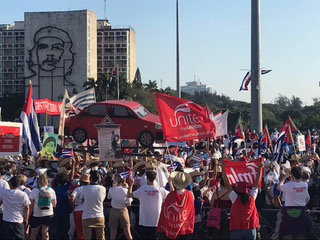From Havana to Santiago de Cuba, the revolutionary people of Cuba are an inspirational force, struggling against the effects of the US blockade on their beautiful country.
Living under the blockade is having a seriously detrimental effect on the day-today lives of Cuban people. The United States has blocked trade between the countries, including deliberately blocking medical materials, such as ventilators and oxygen during a pandemic. Despite facing the dual pandemic of both covid-19 and the US blockade, the health service is the core of their socialist society: it’s free, in abundance, community-based, and concentrates on prevention.
Understanding the risk the blockade would place on their ability to respond to the pandemic in a people-first manner, they spared no time in inventing their own vaccines—five in total. With more than 94 per cent of the population vaccinated against covid, Cuba is one of the most vaccinated countries in the world, giving priority to the vaccination of children from two years old and pregnant women.
Cuba’s health system is based on care, not profit. Because of this they trust science and public-health advice free of commercial interest. There is no anti-vax movement, and people still wear masks in all public places for the collective health of society. Vaccines are shared with countries in the Global South, and Cuban doctors travel to other countries to support them in their health crises.
Outside their covid care they’ve also created cancer vaccines, and are the first country in the world to create a cure for the transmission of HIV from pregnant mother to baby.
The much-admired colourful vintage cars that Cuba is known for are a result of the blockade too. Since 1959 they cannot import new cars or get materials to build or repair them. Those cars often have no seat belts or window panes, and run with unhealthy-sounding noisy rattles. Buildings crumble along the roadside, as there are shortages of construction materials, such as cement.
Despite the many difficulties stemming from the US blockade and the attempts by the United States to crush Cuban socialism, the resolve of the Cuban people is strong. The people persevere, despite the difficult economic conditions, and work to protect Cuba’s sovereignty from the United States.
The Cubans work hard for the collective good of all the people there: they understand the value of their work and its role in keeping the country going: food on the table, free education, free health service, and access to housing for everyone.
During the huge May Day celebration of more than a million people in Havana, and millions more around the country, workers proudly displayed floats of the fruits of their labour. The occasion of May Day spans weeks, with concerts in work-places, international conferences, and community parties—a true celebration of workers, of socialism and the revolution.
Cuba is the most sustainable place in the world, according to the Sustainable Development Index. But they will be disproportionately affected by climate change as globally things get worse. The beautiful beaches and coastal areas will be under water as water levels rise from global warming that they are not the cause of.
Beauty and culture are very important—as the Cuban president called it, creative resistance. This creative resistance could be seen in every community: the people danced, sang, performed spoken word and theatre and displayed art everywhere.
At the International Trade Union Conference in the Cuban parliament the president, Miguel Díaz-Canel, spoke about the values of the Cuban people and said that the highest point of humanity is those who create and give solidarity. “We defend our values of anti-imperialism and trust. Unity within diversity. Against the opulence of some and the plundering of others.“
At present the Cuban people are engaging in a huge participatory democracy process throughout society, in work-places and communities, to discuss how they can constantly improve and innovate under their socialist constitution. Adding to their programmes against racial discrimination, for the advancement of women, for children, and for people with disability, they are now in community consultation on the code for the family, which includes more LGBT rights, equal rights in marriage, divorce, single parents, recognition of children, obligations for children’s care and education, adoption, rights for those in care, and more.
The Cubans’ wide commitment to the revolution, their collective organising and participation in political discussions in work-places through their trade unions and in their communities, is for us to covet.
Che Guevara’s father once said that Che had the blood of the Irish rebels running through his veins. Now we should look to Cuba for inspiration—a country based on strong values of care and collectivism.
A better world is possible!






